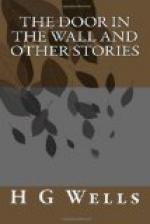And amidst the little population of that now isolated and forgotten valley the disease ran its course. The old became groping, the young saw but dimly, and the children that were born to them never saw at all. But life was very easy in that snow-rimmed basin, lost to all the world, with neither thorns nor briers, with no evil insects nor any beasts save the gentle breed of llamas they had lugged and thrust and followed up the beds of the shrunken rivers in the gorges up which they had come. The seeing had become purblind so gradually that they scarcely noticed their loss. They guided the sightless youngsters hither and thither until they knew the whole valley marvellously, and when at last sight died out among them the race lived on. They had even time to adapt themselves to the blind control of fire, which they made carefully in stoves of stone. They were a simple strain of people at the first, unlettered, only slightly touched with the Spanish civilisation, but with something of a tradition of the arts of old Peru and of its lost philosophy. Generation followed generation. They forgot many things; they devised many things. Their tradition of the greater world they came from became mythical in colour and uncertain. In all things save sight they were strong and able, and presently chance sent one who had an original mind and who could talk and persuade among them, and then afterwards another. These two passed, leaving their effects, and the little community grew in numbers and in understanding, and met and settled social and economic problems that arose. Generation followed generation. Generation followed generation. There came a time when a child was born who was fifteen generations from that ancestor who went out of the valley with a bar of silver to seek God’s aid, and who never returned. Thereabout it chanced that a man came into this community from the outer world. And this is the story of that man.




